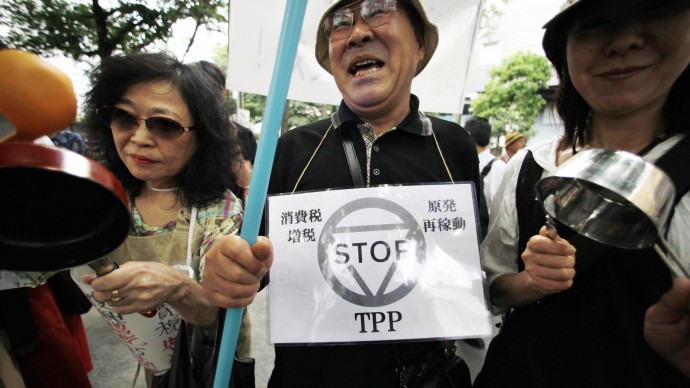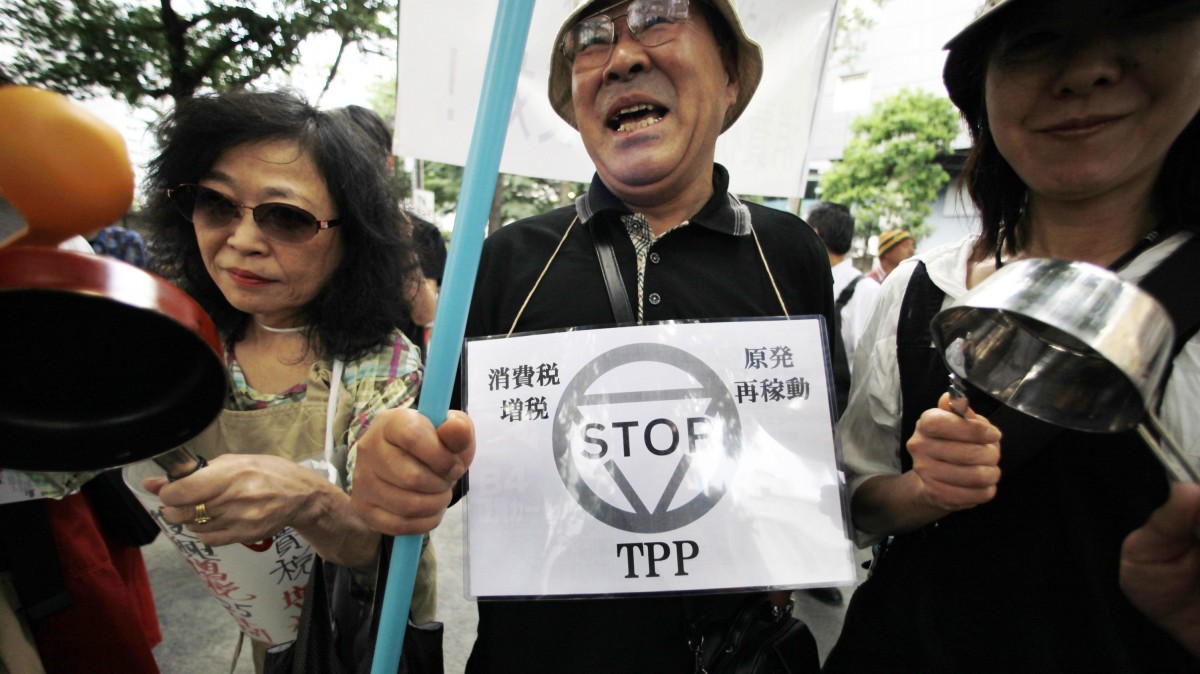
(NEW YORK) MintPress – The Obama administration’s so-called “Asia pivot” has received widespread media coverage ever since the president started to shift his foreign policy focus to Asia-Pacific in order to counter China’s growing power in the region.
Secretary of State Hillary Clinton announced America’s strategic reorientation even before U.S. troops began withdrawing from Iraq.
And following his re-election, despite the ongoing war in Afghanistan and escalating conflicts in the Middle East, Obama’s first foreign visit was to Myanmar, Thailand and Cambodia, all members of ASEAN.
Yet far less publicized is Obama’s bid to challenge China on the economic front through ongoing negotiations for the Trans-Pacific Partnership (TPP), which began in 2007.
The TPP, which would be the largest international commercial agreement since the 1995 World Trade Organization (WTO), would link the U.S., Australia, Brunei, Chile, Malaysia, New Zealand, Peru, Singapore, Vietnam, Mexico and Canada into a “free trade” zone similar to that of the North American Free Trade Agreement (NAFTA).
President Obama has called it “a next-generation trade agreement” and a “model” for future agreements.
Not everyone agrees. The negotiations have been strongly criticized by advocacy groups as well as elected officials because of the extreme secrecy surrounding the talks, the expansive scope of the agreement and a number of controversial clauses in drafts leaked to the public.
The TPP is being negotiated by the U.S. Trade Representative, Ron Kirk, a former Dallas mayor and corporate lobbyist.
Kirk notified Congress on Dec. 14, 2009 that President Obama planned to enter TPP talks “with the objective of shaping a high-standard, broad-based regional pact.” Since that time, 14 formal rounds of negotiations have been held.
Far reaching ramifications
Several leaks of draft agreement chapters by public research organizations and alternative media outlets campaigning against TPP have raised alarm bells.
Canadian researcher and writer Andrew Gavin Marshall claimed, “The Obama administration and other participating nations have been consulting and negotiating not only with each other, but with roughly 600 corporations involved.
“The TPP is accelerating the most dangerous free market policies of previous U.S. administrations, bestowing unprecedented powers and privileges upon Trans-National Corporations (TNCs) while dismantling regulations and laws without any democratic oversight or input,” he continued.
Activist Laurel Sutherlin recently asserted that the TPP is “a wish list of the 1%” and that “of the 26 chapters under negotiation, only a few have to do directly with trade.”
Several members of Congress recently sent a letter to Kirk stating that the TPP “will create binding policies on future Congresses in numerous areas,” including “those related to labor, patent and copyright, land use, food, agriculture and product standards, natural resources, the environment, professional licensing, state-owned enterprises and government procurement policies, as well as financial, healthcare, energy, telecommunications and other service sector regulations.”
Riding roughshod over regulations
The leaked draft treaty also caused a stir among anti-globalization groups. The agreement stipulates that foreign corporations operating in this country would no longer be subject to domestic laws regarding protections for the environment, finance or labor rights.
They could, in fact, appeal to an international tribunal with the power to overrule American law and impose sanctions on the U.S. for violating the rights of corporations. The tribunal would be comprised of corporate lawyers acting as judges.
Said Arthur Stamoulis, the executive director of Citizens Trade Campaign, the draft texts “clearly contain proposals designed to give transnational corporations special rights that go far beyond those possessed by domestic businesses and American citizens.”
In addition, TPP countries have not yet agreed on a set of obligations for corporations to meet in regard to health, labor or environmental standards.
Guarding intellectual property claims
The proposals have been accused as well of being excessively restrictive on copyrights and patents, in effect protecting pharmaceutical companies.
As British journalist Dean Baker explained in the Guardian, the stronger patent rules establish “a government-granted monopoly, often as long as 14 years, that prohibits generic competitors from entering a market based on another company’s test results that show a drug to be safe and effective.”
These laws are actually “the opposite of free trade,” since they “involve increased government intervention in the market” and “restrict competition and lead to higher prices for consumers,” he added.
Several congressmen, including Sen. Bernard Sanders and Reps Henry Waxman, Sander M. Levin, John Conyers, Jim McDermott, John Lewis, Pete Stark, Charles B. Rangel and Lloyd Doggett have expressed concerns about the effect the TPP requirements would have on access to affordable medicine in the developing world.
Generic drug manufacturers in countries like Vietnam and Malaysia would suffer. So would sales of larger generic makers in the U.S., Canada and Australia, which provide much of the global low-cost drug supply.
As Waxman noted, “In many parts of the world, access to generic drugs means the difference between life and death.”
According to a spokesperson for Doctors Without Borders, “Bush was better than Obama on this.”
Cloaked in secrecy
In May, a group of 30 law professors called on Kirk to reverse the “dialing back” of stakeholder participation and make negotiating texts public.
They claimed that the negotiations excluded interested parties such as “consumers, libraries, students, health advocacy or patient groups, or others users of intellectual property” and that it only offered “minimal representation of other affected businesses, such as generic drug manufacturers or Internet service providers.”
Kirk initially responded that he was “strongly offended by the assertion that our process has been non-transparent and lacked public participation” and that it was actually far more transparent than the negotiations for previous free trade agreements.
The group responded that free-trade agreement negotiations, notorious for their secrecy, are “the wrong standard for assessing the legitimacy of the TPP negotiations.”
It also accused Kirk of sidestepping the issue of transparency, and pointed out that transparency is less about the degree of public input, and more about “the flow of information the other way — information about the workings of government being visible to the people it is supposed to represent.”
On May 23, Sen. Ron Wyden introduced legislation that would require the Office of the U.S. Trade Representative (USTR) to disclose its TPP documents to all members of Congress.
He said the bill clarifies the intent of a 2002 legislation that was supposed to increase Congressional access to information about what the USTR is doing but which is being incorrectly interpreted by the agency as justification to limit such access.
Meanwhile, a 15th round of negotiations is scheduled to take place Dec. 3-11 in Auckland.
Congress must still vote to approve it but would most likely have to do so under a “Fast Track” provision that prohibits any amendments and limits debate.


